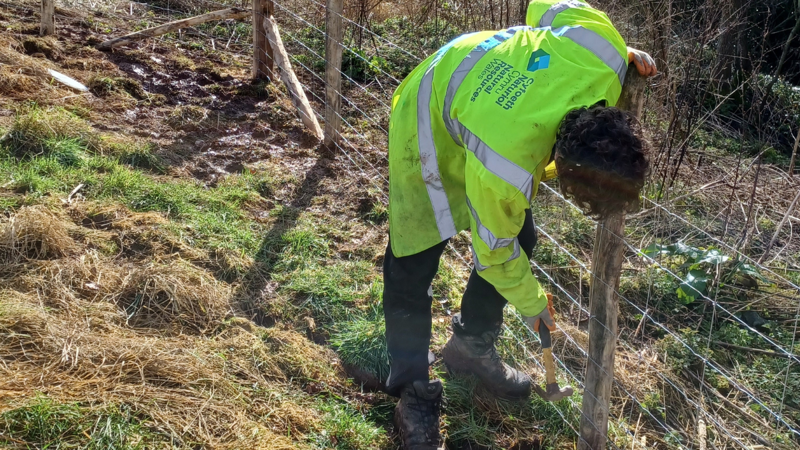Project helps to deliver multiple benefits for nature and farming in Monmouthshire

Natural Resources Wales (NRW) is working with farmers and other landowners in Monmouthshire to deliver nature-based solutions that will support sustainable agricultural practices, enhance local ecosystems, and improve water quality in local rivers.
The way in which land is used can lead to high levels of erosion and soil run off into nearby streams and rivers. This can smother river gravel beds and reduce vital spawning habitat for fish.
The Central Monmouthshire Opportunity Catchment Project (CMOC) uses a range of long-term natural solutions, that will help improve water quality in the Rivers Usk and River Wye catchments and, increase the resilience of local ecosystems.
The nature-based solutions could provide numerous benefits to farmers including better soil health, improved grazing management, and boost animal health , helping to support a resilient farming system.
At Glen Farm in Monmouthshire, 400 meters of new mixed-species hedgerows have already been planted, along with additional trees within a woodland block and alongside the watercourse, totalling 2,500 plants. Additionally, 780 meters of fencing has been installed to protect the riparian corridor and the newly planted areas.
These improvements will help the farmer manage their livestock, as well as protect 200m of a watercourse which runs through the holding and is a tributary of the River Monnow.
The fencing will prevent livestock entering the river and reduce the risk of soil erosion from the embankment which can cause high levels of sediment concentrations in the watercourse.
A reduction of soil in the water will help protect the quality of gravel beds, safeguarding fish spawning sites. The buffer zone created by the fencing will also help improve water quality by acting as a filter strip, slowing the flow of water, and reducing nutrient run off, as well as improving the habitat for otters which have been recorded in the area.
A mixture of Hazel, Oak, Birch, Crab Apple, Alder, and Rowan trees have been planted on the farm –, which will help to intercept water run-off and increase infiltration into the ground. This will limit the impact on the rest of the farmland, whilst also providing shade for life in the river and shelter for livestock in bad weather.
The trees will also lock up carbon, helping to mitigate the effects of climate change and increase habitat connectivity for local species such as bats and hazel dormice.
Ed Davies, Senior Environment Officer for Natural Resources Wales said:
We’re really pleased to be working with farmers and other landowners on this project, which uses natural processes to help address issues impacting water quality, climate change, biodiversity loss and water scarcity.
Implementing nature-based solutions on farmland, such as using natural vegetation to filter water, planting trees to absorb carbon dioxide, or restoring wetlands to prevent flooding will help to foster a healthier and more resilient environment. The project is part of our wider work to tackle the climate and nature emergencies.
Everyone who lives and works within our river catchments has a part to play in safeguarding and improving the environment. We need to work together on how we design developments and use land, as well as consider what we do in our everyday life that can reduce the impact we have on the natural world.
Scott Millar, owner of Glen Farm in Monmouthsire said:
I’m really pleased with the project, it will help me manage my grazing and will provide shelter for the livestock as well as improving the biodiversity on the land and will help the water quality/drainage.
Elsewhere, work has also been carried out collaboratively at the Grange Farm in Monmouth led by Bannau Brycheiniog National Park, to create leaky barriers in a tributary of the Llymon Brook catchment, which runs through the holding.
The barriers help to hold back water within the channel and encourage water to spill onto the banks during periods of heavy rainfall, reducing the risk of flooding downstream by temporarily storing water and slowing its flow downstream.
Leaky barriers also provide a variety of habitats for wildlife and are set above normal stream level, so baseline flows and fish movement are not impeded.
The Central Monmouthshire Opportunity Catchment project is funded through the Welsh Government’s Water Capital Programme, which supports a number of environmental priorities including river restoration, metal mine remediation, fisheries and water quality.
